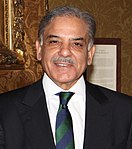Pakistani general election, 2018
|
|
|||||||||||||||||||||||||||||
|---|---|---|---|---|---|---|---|---|---|---|---|---|---|---|---|---|---|---|---|---|---|---|---|---|---|---|---|---|---|
|
|||||||||||||||||||||||||||||
|
|
|||||||||||||||||||||||||||||
|
All 342 seats in the National Assembly 172 seats needed for a majority |
|||||||||||||||||||||||||||||
| Opinion polls | |||||||||||||||||||||||||||||
|
|||||||||||||||||||||||||||||
|
|||||||||||||||||||||||||||||
General elections are scheduled to be held in Pakistan on 15 July 2018.
In June 2017 the Economic Coordination Committee approved the procurement of new printing machines with a bridge loan of 864 million rupees. The government has also developed new software for the Election Commission of Pakistan and NADRA to ensure a "free, fair, impartial, transparent and peaceful general election." The Federal Law Minister Zahid Hamid elaborated that youth reaching the age of 18 will automatically be registered as voters when they apply for a CNIC from NADRA.
The 342 members of the National Assembly are elected by three methods; 272 are elected in single-member constituencies by first-past-the-post voting; 60 are reserved for females and 10 for ethnic and religious minority groups; both sets of reserved seats use proportional representation with a 5% electoral threshold.
...
Wikipedia



